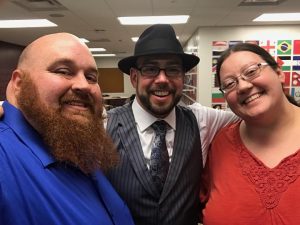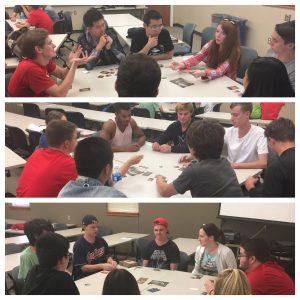This week in class, we played an awesome hidden role game called Two Rooms and a Boom, where there are two teams (red and blue) with two different objectives. There are also “gray” players who have individual objectives to win the game, regardless of the outcome of the red/blue battle. People are split into different rooms, and then given a random card designating their team and special role, if any. On the red team there is a bomber, and on the blue team there is a president. A leader is chosen in each room, who decides which hostages to trade with the other room’s leader every round. At the end of the game, the red team wants the bomber to be in the same room as the president, and the blue team does not want this to happen.
Right off the bat, we are naming people “leader” and giving them ultimate control of the current state of the game. It was interesting to see which people jumped to the front and requested to be leader, and how others wanted to stay in the back. Someone with a dominant role like President or Bomber may want to be in control because they are important pieces to the team’s objective. However, some roles (particularly gray players) require you to be a little more relaxed and not running too much of the game. For example, I was a gray Romeo character, where at the end of the game I want to be in the same room as Juliet and the bomber. I honestly didn’t care how the red vs blue war turned out, so I offered to be more of a supporter for whatever team tried to help me. The game is interesting from that perspective, because you are not an active decision maker. I was much more of a follower, while the leader of the room was directly trying to influence the game to meet his/her objective.
The hardest part of Two Rooms and a Boom was completing your task without making it obvious as to which role you were playing. If the leader was on the red team, he clearly wants the bomber to find the president, but can’t make that super obvious or the blue players in the room will elect a new leader. Hidden role games are extremely difficult in this regard, and require extra strategy and communication skills between players. While this is difficult, it is also one of my favorite parts of this genre of game because of the creativity involved in achieving your objective.
My friend Ryan would absolutely love this game. He’s huge into hidden role games, and this one adds just an extra element of immersion by physically being in different rooms and swapping hostages. If possible, I really want to find out a way to play this with a group of friends in my apartment sometime, because it’s so much fun. Definitely my favorite game we’ve played so far.




